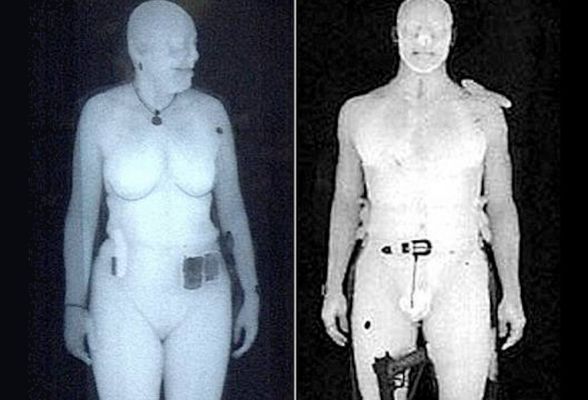
Privacy-by-Design and Airport Screening Systems
Checkpoint screening systems at airports are my favorite example for demonstrating how important it is to build ‚ethical' machines. With the help of ‚good' legislation, the regulator can help enforce ethical awareness among high-tech firms.
If manufacturers of airport screening systems study the EU Commission's new proposal for data protection regulation, they will see that they will only be allowed to process „those personal data...which are necessary for each specific purpose of the
processing". Now to be clear: To ensure security at airports, manufacturers of body screening systems do not need to take a precise picture of a person - they only need to capture contours (see figure). With the new European proposal for data protection regulation, which will hopefully soon be ratified, all body screening systems that create a precise representation of a person may become illegal. At least this is how I interpret the new legislation. I am happy about this, because for once we are getting a really ‚good' law from Brussels. And for sure, I will not need to strip in front of the security guys!
Privacy-friendly version of full body screening
There is just one catch. Ostensibly, there is only one company that can offer a privacy-friendly version of full body screening: L3 Communications Security and Detection Systems from the US. So, if each of our 468 European airports purchased just 2 screening systems over the coming years, 1,2 billion Euro in procurement costs would go directly to a US company. If this happened, would we begrudge the good fortunes of our American friends? Probably yes. And I believe that it is for this reason that the EU Parliament finally agreed last September to allow body-screening systems that produce precise body images. Defending „made in Europe" by denying some of „old Europe's" values...
But has this been an economically wise decision? No, I don't think so, because our parliamentary folks have just allowed inferior technology to enter the market. Body scanners that show how pretty we all are beneath the surface are unlikely to succeed in the market. L3 Communications will therefore be more competitive anyways, simply because they have put more guts into the technology they propose. They have built a more ethical machine!
Competitive advantage
The example shows that tech companies that take data protection and privacy-by-design seriously can leverage competitive advantage. Therefore, I personally don't begrudge the 1,2 billion Euro to L3. With the new data protection regulation, European companies will soon be required by law to become smarter and come up with solutions that enable them to compete with the help of privacy by design.

